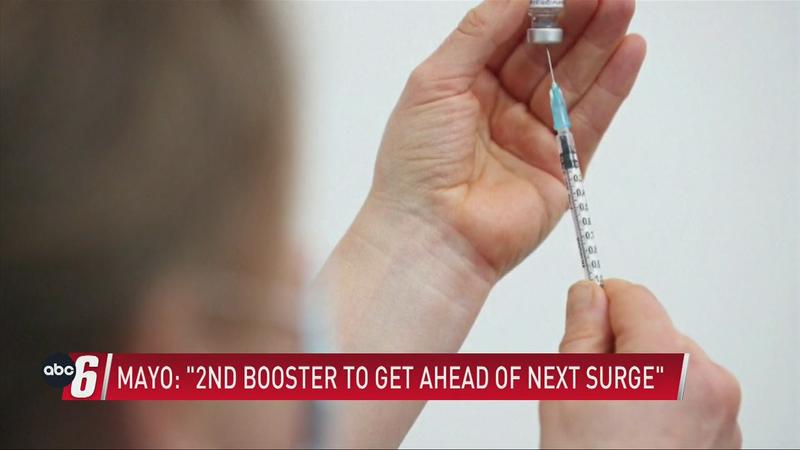Mayo Clinic doctor: 2nd booster released to get ahead of next surge
[anvplayer video=”5101419″ station=”998128″]
(ABC 6 News) – The announcement of a second COVID-19 booster for Americans over 50 caused confusion – is now the best time to get another shot, as Omicron numbers appear to wane?
Mayo Clinic wants to set the record straight.
Dr. Gregory Poland, an infectious diseases expert and head of Mayo Clinic’s Vaccine Research Group, thinks some of that confusion came from good intentions – “a permissive recommendation in the interest of trying to get ahead of the next surge.”
“Once the surge starts, you can’t immunize 300 billion people inside of a day, or a week, or even a month, very likely,” he said.
Multiple variants – each more transmissible than the last, with the BA2 variant spreading two to three times as easily as the original Wuhan COVID strain,
“Let me make the analogy – I could look up in the sky, and I could tell you the exact GPS coordinates of that jet,” he added. “By the time I turn to you and verbally relay those coordinates, that airplane is no longer at that coordinate, and it’s miles away.”

And the next surge (BA.2) has already begun around the globe in the United Kingdom, Northeastern U.S. (especially New York) as vaccine and booster immunity wanes.
Poland admitted that an Israeli study concluded that the benefit of a second COVID booster was fractional, bringing healthy adults from a 0.1 percent risk of COVID death to 0.03 percent. While that number would be very visible in a large population, the average person won’t feel any difference.
However, the booster does increase antibody levels for 4-12 weeks before they begin to wane again.
Poland concluded that as booster benefits are real, but short-lived, older adults especially should consult with their doctors to decide when to “pull the trigger.” An older adult in a high-transmission situation, who plans to travel, or has other health risks may want to boost now.
Someone healthy and in a low-transmission area who masks consistently could “watch closely and hold.”
“My guess is, we’ll all be getting the booster, it’s just a question of when we get it to have the maximum benefit,” he said.
Here are more vaccine takeaways from Poland:
- The COVID vaccine and boosters are based on the original illness, while new variants get further and further from the Wuhan strain. Poland said the “kinetic” viral situation, with a quick rate of change, is one consequence of the U.S. “not taking the pandemic as seriously as we should,” as refusal to mask and distance allows COVID to spread and mutate.
- There have been studies on variants, but new variants emerge “almost faster” than scientists could produce a new vaccine – certainly faster than policymakers could explain and promote a new vaccine to the public.
- If scientists developed a “pan-Corona” vaccine which could protect against multiple strains of COVID, the world could move toward annual vaccinations despite the possibility of multiple surges in a year. However, there is not a vaccine that can protect against an extremely mutable virus now.
- The COVID vaccine provides a “gradient of protection” – it is extremely effective at preventing death, very effective at preventing severe disease, moderately protective against moderate illness, and mildly effective against mild cases, as Poland tells it.
- In general, Poland said, an episode of infection works like a COVID booster – it likely protects against severe disease for roughly 6-12 weeks, barring comorbidities or other health issues. However, people can be reinfected within that time period, especially with a new variant.